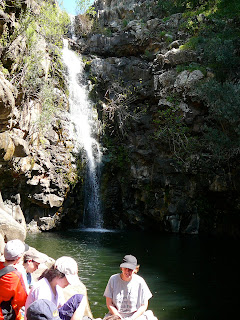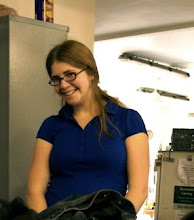Haredim...
Last week, my friend and fellow Pardes student Dan and I joined a group of leaders and staff from the Jewish Agency's Board of Governors meeting to take a tour exploring ultra-Orthodox (haredi) life in Israel. The tour took us to a girls' school in the haredi Jerusalem neighborhood of Geula, a business employing primarily haredi women in Modi'in Illit, and an employment center in Beit Shemesh. I learned a lot more on the trip than I was expecting, especially since Dan and I had been told that our primary role in being there was to talk about the impact that
MASA (a project of the Jewish Agency and the Israeli government that is one of the key financial reasons that enables me to be in Israel now) has had on us. It was a great opportunity to see a slice of Israeli life that I don't come into much contact with in my life in the liberal, pluralistic community of South Jerusalem.
The haredi community is usually very separate from the rest of Israeli society (or the society of whatever country they are living in). They live in tight-knit communities, marry within their communities, and remain within the haredi world for employment, avoiding contact with the secular world. This can be seen even by looking at the itinerary for my day exploring the haredi world. Our first stop, Geula, is a Jerusalem neighborhood inhabited almost entirely by various sects of the haredi community. The second location, Modi'in Illit, is an
entirely ultra-Orthodox city/settlement, on the other side of the Green Line. It has a population of 50,000, and is the fastest growing city and settlement in Israel.
The common thread among most of the places we visited was how haredim can participate in modern society while still remaining within the haredi community. In Modi'in Illit, we visited CityBook, a business that hires haredi women to do legal work that has been outsourced from an American real estate company. 10-15% of the work force is out on maternity leave at any given time, due to the emphasis on family and childbearing in the haredi community! I was really struck by how the company made both halachic (Jewish law) and cultural adjustments to their offices in order to be a viable employment option for these women. After consulting with rabbinic authorities, they put glass windows into all of the office doors, to enable a man and a woman to have a private business meeting without violating Jewish laws about men and women being alone. Culturally, they set aside a room in the offices for women to use when coming back from maternity leave for pumping breast milk, instead of using a closet or trying to find other private space like women in so many other offices have to do. That's not a legal adjustment, but it is acknowledging the cultural realities of the community. One of the women employees raised the point that haredi women have always entered the workforce; historically they were expected to be the family's primary breadwinners while the husbands studied fulltime in
yeshivot. What's different now is that the community and businesses are approaching it on a more collective level, by placing offices and businesses in places that are physically the center of haredi life. The business even receives subsidies from the Israeli government, which wants to encourage employment of minorities, including the haredi and Arab sectors of the labor force.
In Beit Shemesh, we met with three soldiers from the Israeli Defence Forces unit Nahal Haredi. The rabbi who founded it (originally from Boston!) wanted to address the rift between the secular and religious parts of Israeli society. One of the biggest points of contention is army service - most ultra-Orthodox men don't serve in the IDF, unlike the rest of their peers who serve in some way, either through enlisting in the IDF or doing national service (volunteering in some part of Israeli society). A popular bumper sticker in Israel, reflecting this tension, reads "גיוס לכולם - Enlistment for All." This special army combat unit was created to make a space for haredi young men to serve in the army without having to compromise their religious practices and cultural standards. The unit is 70% haredi and 30% national religious (modern Orthodoxy in the US) - but everyone is religious. One of the soldiers said, "This is not the place for non-religious guys looking to spend less time in the army." The soldiers do two years of combat service, and their third year in the army focuses on vocational training and completing their high school diplomas, so that post-army, the men who participate in this combat unit can enter the workforce. In Israel, it's very difficult to enter the labor force in a meaningful way if one hasn't served in the army, and for haredi men, they have not studied secular topics or gained any marketable skills other than learning gemara.
It struck me the extent to which Nahal Haredi has caused the IDF to change, rather than creating change within the haredi community itself. These are two social institutions in Israel that, at least at face value, are incompatible. The army adjusted to make space for the haredi world, rather than the haredi world adapting itself to the army. Although the unit has been around for 10 years, they still struggle to recruit young men to it. Those who come are often those who haven't succeeded in yeshiva, and like young people in any society who don't succeed on their expected path, are drawn to drugs, drinking, fighting, etc. (instead of addressing potential learning disabilities or different aptitudes that might lead to a young man not thriving in a yeshiva environment). Many of the soldiers are told by their families to not come home, and if they do, to not come home wearing their army uniforms. There is a lot of anger and embarrassment still within the haredi community to some of their sons participating in Israeli society in this very basic way.
The funniest moment of the day occurred as we were leaving lunch with the haredi soldiers. They are young men, look like any other young Israeli soldier - wearing small kippot, very clean-shaven, have the sleeves of their army uniforms rolled up as far as possible (it shows how macho you are, obviously. Only weaklings roll their sleeves down). I asked a question of the speakers and got a rushed answer because we needed to be leaving. As I was collecting my things, one of the soldiers came over to me and very eagerly said, "What was your question? I can answer it!" I was dressed my most modestly for the day - long denim skirt, carefully layered shirts, looking very much the part of a modest Orthodox young woman. I thought, "You don't want this, honey. I know it looks like you do, but you really don't...I'm going to be a Reform rabbi, I study gemara...really, really not your type!"
...and Hamentaschen!
Last weekend was Purim! In Jerusalem, this resulted in a four and a half day weekend! We had a half-day of school on Thursday due to the Fast of Esther, no school on Friday and Saturday as usual, Sunday off for Purim, and Monday off for Shushan Purim. Shushan Purim is celebrated in walled cities (such as Jerusalem), in recognition of the fact that the Jews of Shushan (the walled Persian city where much of the Purim story takes place) had an extra day to pursue and kill their enemies than Jews in the rest of Persia. Excellent. Sheryl and I went to the shuk on Thursday afternoon; I had to buy ingredients for the Shabbat lunch I was hosting as well as materials for mishloach manot (packages of food and treats sent to friends and neighbors on Purim). The candy store was PACKED with others looking for the same thing. The next day, on Friday, as I walked past the high school near my house, I saw a teenage girl run out of the Purim party/carnival to pick up some baked goods from a parent waiting in a car in the street. Her costume? Sexy Santa.
Although it rained all weekend (and the Dead Sea has risen 8 centimeters!), the rain stopped (some) in time for Shushan Purim. Sara G. and I went to hear the megillah read at Kol Haneshama (well, two chapters of it), and then ran through the pouring rain to Pardes to see (and act in!) the Purim shpiel. The next day, by some miracle of heaven, I woke up in time to go to a megillah reading organized by Women of the Wall at the Kotel. (See this interesting
article from the Jerusalem Post about women's megillah readings.) After some much needed lunch and a nap, I went to a seudah (festive meal) at my teacher Meesh's house, along with most of the rest of Pardes. One of the things I love about the Pardes community is that our teachers do things like open up their homes to the entire student body for holidays, it was very sweet of Meesh, her husband, and her kids to host all of us.
 Noam and I in our costumes (he's the Rambam!) at Kol Haneshama megillah reading - Terry told me it looked like I wasn't in costume, I had just walked into the wrong synagogue!
Noam and I in our costumes (he's the Rambam!) at Kol Haneshama megillah reading - Terry told me it looked like I wasn't in costume, I had just walked into the wrong synagogue!
 Women's megillah reading at the Kotel
Women's megillah reading at the Kotel










